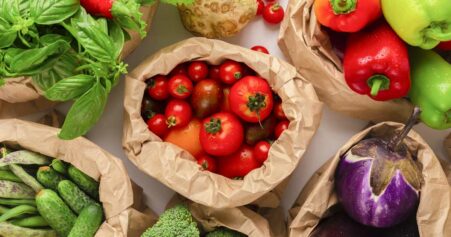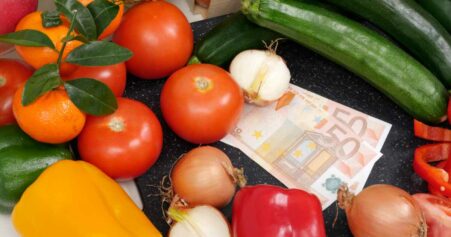Table of Contents
According to some reports, a vegan pregnancy can be dangerous for the unborn child. But if you are vegan, should you eat products of animal origin during pregnancy or, if you do not want to, should you even give up having a baby? In this article, you will learn how to meet your increased nutritional needs during a vegan pregnancy and why it may actually be good for you and your baby.
Is a Vegan Pregnancy Dangerous?
There are not many current studies that specifically examine the effects of vegan pregnancy on the offspring. But the studies that do exist indicate that both growth and weight of babies born to vegan mothers are within the normal range after birth. They are often smaller and lighter than babies born to mothers on a mixed diet, but overall there is no evidence that a well-planned vegan pregnancy is dangerous for the unborn child (Ferrara et al., 2019; Weder et al., 2019; Piccoli et al., 2015).
Pregnancy and Nutrient Needs
During pregnancy, the requirement for most nutrients increases. According to one study, 63 % of women of childbearing potential already take supplements, regardless of their diet. Iodine was substituted by 24 % of respondents before pregnancy and by 77 % during pregnancy. 65.3 % took iron and 33.7 % took folic acid supplements before pregnancy (Becker et al., 2011). Nutritional societies recommend folic acid supplementation before and during pregnancy and iodine supplementation for all pregnant women (Lopes et al., 2022; Dweyer et al., 2022). Iron intake in pregnant women is often insufficient to meet the increased requirement. Therefore, special attention should be paid to this trace element during blood testing, and it should be supplemented as needed (Koletzko et al., 2018).
Particularly Important Nutrients During Vegan Pregnancy
Due to increased nutrient needs, it is known that some pregnant women may have problems taking in the following micronutrients in sufficient amounts (Koletzko et al., 2018):
- iron
- iodine
- folate
- vitamin D
- calcium
- polyunsaturated fatty acids (omega-3 fatty acid DHA)
In addition, vegans should pay special attention to
- vitamin B12
- dietary protein
- zinc
There are no clear recommendations for zinc supplementation during vegetarian-vegan pregnancy. Some studies show that the vegetarian and vegan pregnant women studied did not consume enough zinc in their diets. However, Foster and colleagues concluded in their meta-analysis (2015) that a low zinc intake in a vegetarian-vegan pregnancy would not lead to a worse zinc status, nor to a change in pregnancy duration or birth weight. Therefore, it may be sufficient to include zinc-rich foods (or example whole grains, legumes, nuts, and seeds) in the diet to achieve a sufficient zinc status.
In contrast, as a vegan pregnant woman, you may have less to worry about the following nutrients because you probably will automatically get enough (Key et al., 2006; Rizzo et al., 2013, Clarys et al., 2014; Koebnick et al., 2005):
- folate
- vitamin C
- vitamin E
- magnesium
- dietary fiber
- phytonutrients
Researchers who have studied the nutrient needs of vegan pregnant women have concluded that, overall, nutrient needs can be met by a plant-based diet (Baroni et al., 2018; Mangels and Messina, 2001).
How to Avoid the Risk of Inadequate Nutrient Intake
If you follow the nutrient intake recommendations in Table 1, you probably meet your needs during your vegan pregnancy.
Table 1: Potentially Critical Nutrients And Good Sources for Meeting Your Vegan Pregnancy Needs
| Potentially critical nutrient | Good sources |
| iron | legumes, oatmeal, quinoa, fennel + citrus fruits or fruit juices |
| iodine | iodized table salt, nori algae, supplement |
| calcium | fortified products (e.g., dairy alternatives, sesame seeds (tahini), chickpeas, almonds, dried fruits, amaranth, calcium-rich mineral waters |
| zinc | whole grains and pseudo grains, legumes, pumpkin seeds + citrus fruits |
| omega-3 fatty acids | microalgae oil or DHA-enriched vegetable oil, flaxseed/oil, walnuts/oil, canola oil. |
| protein | soy products, seitan, legumes + grains, broccoli |
| vitamin D | fortified food, supplement |
| vitamin B12 | supplement (absolutely necessary) |
| vitamin B2 | almonds, lentils |
By the way: As mentioned above, vegans usually take in enough folate through their diet, so that additional supplementation of synthetic folic acid is not absolutely necessary. While a sufficient supply is very important to prevent neural tube defects, there are indications that high doses of folic acid could also have a negative impact on the health of mother and child (Valera-Gran et al., 2017; Mason and Tang, 2016). Therefore, discuss the intake with your doctor.
Vegan Diet During Pregnancy: Advantages
1. You are used to managing your diet.
As a vegan, you know how important diet is to your health. You know which nutrients you need to watch out for, and you can plan your diet accordingly. With regular blood tests, you know what your nutrient levels are. This means you do not have to make major changes during pregnancy, which can leave you feeling overwhelmed and stressed.
2. You have a healthier pregnancy.
Because of the high consumption of fruit and vegetables and the overall nutrient-dense diet, you are getting a lot of health-promoting substances and very little of potentially harmful ones. The average low energy density of a vegan diet prevents unnecessary weight gain during pregnancy (Streuling et al., 2011). This lays the groundwork for good development of your child and also reduces the risk of discomfort.
By avoiding products of animal origin, you automatically avoid the main sources of listeriosis, toxoplasmosis and salmonellosis (blue cheese, feta, raw meat and sausages, raw fish, eggs) (Koletzko et al., 2018). There is also evidence that vegan pregnant women are less likely to suffer from pre-eclampsia and gestational diabetes (Sebastiani et al., 2019). Postpartum depression and infant and maternal mortality are comparatively less common after a vegan pregnancy. In addition, pregnancy complications or adverse outcomes are no more common than in other mothers (Pistollato et al., 2015).
3. Your child has a lower risk of many diseases during and after pregnancy.
Your micronutrient-rich diet has a positive impact on your child’s development (Sebastiani et al., 2019). In addition, the fetus experiences reduced genotoxic exposure to polycyclic aromatic hydrocarbons and N-nitroso compounds. Studies have also shown a reduced risk of respiratory disease and eczema, diabetes, and cleft palate. Since you do not eat fish, you do not run the risk of getting heavy metals from it. There is also evidence that fish consumption during pregnancy may be associated with respiratory problems and food allergies in the baby. Consuming DHA-enriched vegetable oil can provide the beneficial effects of the omega-3 fatty acid docosahexaenoic acid (DHA) without eating fish (Pistollato et al., 2015).
4. Your child may have long-term health benefits.
A vegan pregnancy can reduce the risk of overweight and obesity in childhood, adolescence and even adulthood (Sabaté and Wien, 2010; Beyerlein et al., 2011; Mamun et al., 2010). In addition, the risk of several cancers appears to be reduced by high fruit and vegetable consumption and the associated high intake of vitamins, minerals, fiber, and phytochemicals (Pistollato et al., 2015).
Vegan Pregnancy – Summary
A conscious whole-food diet combined with targeted supplementation can help you meet your nutritional needs during your vegan pregnancy. Due to the nutrient-dense diet, vegan pregnant women usually have a good nutritional status, and both mother and child can benefit from the long-term advantages of a plant-based diet.
In vegan pregnancy and lactation, specially designed dietary supplements can help meet the (increased) nutritional needs. These should be selected based on the individual diet and health parameters. As with all pregnant women, regular monitoring of health and nutritional status is essential to ensure good development of the unborn child.









Leave a Reply